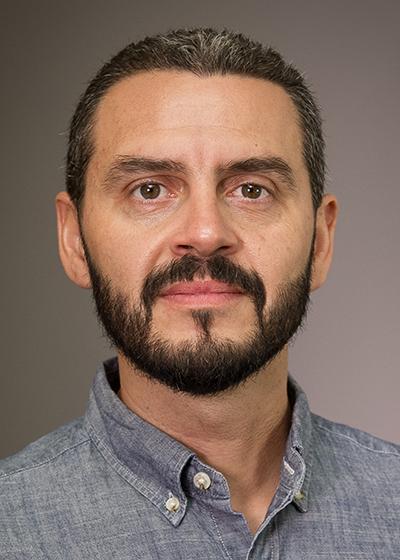Dr. Karamalidis is an Assistant Professor of Environmental Systems Engineering of the John and Willie Leone Family Department of Energy and Mineral Engineering of the Earth and Minerals Science College at The Pennsylvania State University. He holds a BS in Chemistry from University of Crete and a PhD in Environmental Engineering and Science from Democritus University of Thrace. After his PhD training, became a visiting research scholar of Environmental Engineering at Carnegie Mellon University and an ORISE Post-Doctoral Fellow specialized in geochemistry at the National Energy Technology Laboratory of the US Department of Energy. Dr. Karamalidis brings more than 12 years of combined experience in applied engineering, research and development across different disciplines, such as resource recovery for critical materials, geochemistry, water chemistry and surface complexation modeling. He is member of various professional societies and held the position of Member of the Board of Directors and Secretary General of the Board of Directors of Association of Greek Chemists for many years.
This faculty member is associated with the Penn State Intercollege Graduate Degree Program (IGDP) in Materials Science and Engineering (MatSE) where a multitude of perspectives and cross-disciplinary collaboration within research is highly valued. Graduate students in the IGDP in MatSE may work with faculty members from across Penn State.
The overarching theme of Karamalidis research is to understand and improve the environmental performance of emerging technologies in resource recovery, geological storage and utilization of carbon dioxide, and unconventional oil and gas development. Karamalidis’ research is focused on developing new technologies using innovative chemistry and engineering for resource recovery, such as recovery of critical materials from secondary sources, and understanding the fundamental science for the environmental and geochemical processes involved in water-energy-mineral resource recovery and production domain. Karamalidis’ research is also focused on assessing potential impacts on groundwater by organic contaminants and developing strategies for mitigating impacts. Some of Karamalidis research and professional interests involve:
- Resource recovery: Emphasis on new technologies for the extraction and recovery of critical materials and rare earth elements, primarily from secondary sources; Geochemistry of rare earth elements.
- Unconventional Oil and Gas: Shale gas operations geochemistry, hydraulic fracturing, enhanced oil recovery.
- Energy and environment: Geochemical phenomena under CO2 storage conditions in geologic formations, groundwater and shallow aquifers; Characterization, fate, and remediation of oil-derived hydrocarbons in water, soil, and sediment; Hazardous and toxic waste site remediation.
- Water: Chemistry and geochemical modeling of aqueous system
Selected Publications Include:
- Callura J., Perkins K., Washburn N., Noack C.W., Dzombak D.A., Karamalidis A.K. “Selective Adsorption of Rare Earth Elements onto Functionalized Silica Particles”, Green Chemistry 20, 1515-1526 (2018).
- Burant A., Lowry G., Karamalidis A.K., “Measurement and Modeling of the Setschenow Equation for Selected Hydrophilic Compounds in NaCl and CaCl2 Simulated Carbon Storage Brines”, Accounts of Chemical Research 50 (6), pp 1332–1341 (2017).
- Zhang L., Parthasarathy H., Karamalidis A.K., “Investigation on arsenopyrite dissolution and As (III) migration under geologic carbon storage conditions: a numerical simulation approach”, Greenhouse Gases: Science and Technology, 7(3), 460-473 (2017). (Featured as cover)
- Noack, C.W., Perkins, K., Callura, J., Washburn, N. Dzombak, D.A., and Karamalidis, A.K., “Effects of Ligand Chemistry and Geometry on Rare Earth Element Partitioning from Saline Solutions to Functionalized Adsorbents,” ACS Sustainable Chemistry & Engineering, 4:6115-6124 (2016).
- Burant A., Thompson C., Lowry G., Karamalidis A.K., “New Linear Partitioning Models based on Experimental Water – Supercritical CO2 Partitioning Data of Selected Organic Compounds”, Environmental Science & Technology, 50(10), 5135–5142 (2016).
- Parthasarathy H., Liu H., Dzombak D.A., Karamalidis A.K., “The Effect of Na-Ca-Cl Brines on the Dissolution of Arsenic from Arsenopyrite”, Chemical Geology, 428, 1-7 (2016).
- Burant A., Lowry G., Karamalidis A.K., “Measurement of Setschenow Constants for Six Hydrophobic Compounds in Simulated Brines and Use in Predictive Modeling for Oil and Gas Systems”, Chemosphere, 144, 2247-2256 (2016).
- Karamalidis A.K. and Dzombak D.A. (2010) “Surface Complexation Modeling: Gibbsite”, pp. 312, John Wiley & Sons, New York, New York, ISBN: 0470587687.
- Prime Minister's Awards for Scientific Ingenuity of Trinidad and Tobago for Scientific Creative Solutions (2015).
- Berkman Faculty Development Award, Carnegie Mellon University, Pittsburgh PA USA (2014).
- ORISE Faculty Fellowship Program: Oak Ridge Institute for Science and Education (U.S. Department of Energy) (2012 – present).
- ORISE Postdoctoral fellowship: Oak Ridge Institute for Science and Education (U.S. Department of Energy) (2009 – 2010).


